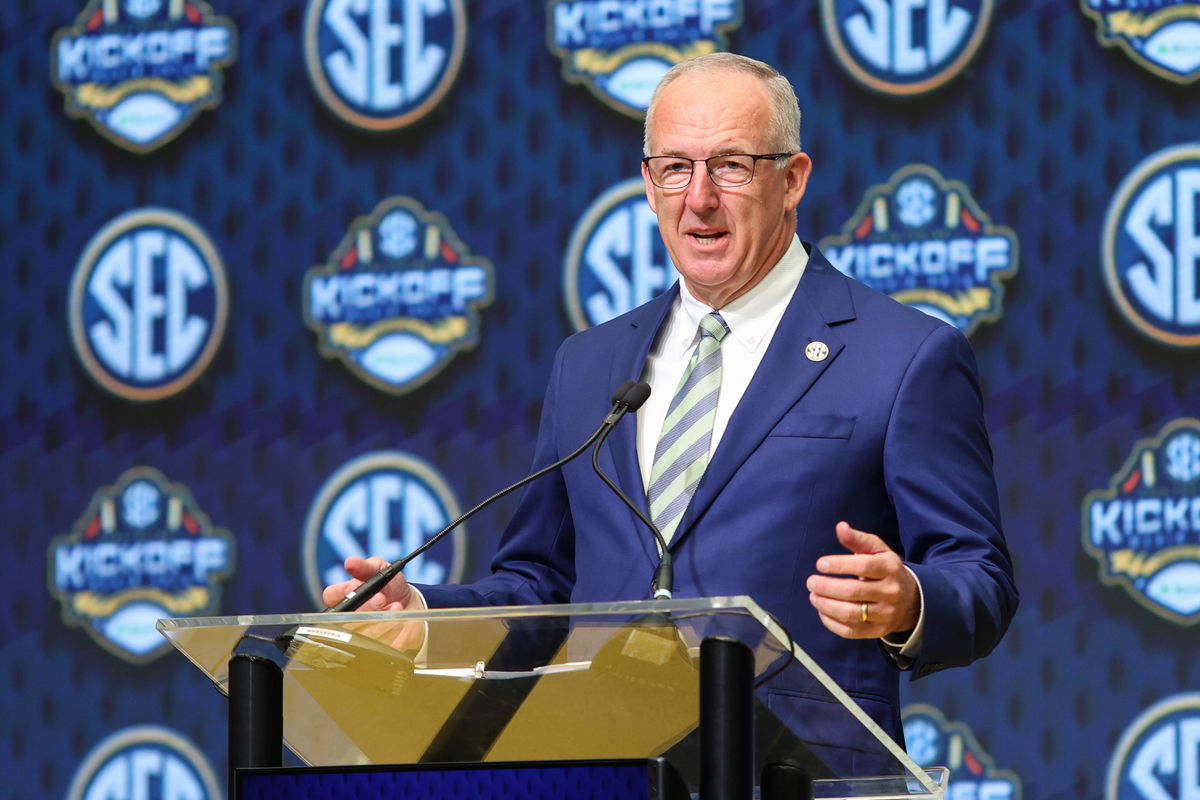
Imago
NCAA, College League, USA Football: SEC Media Day Jul 16, 2025 Atlanta, GA, USA SEC commissioner Greg Sankey speaks to the media during the SEC Media Day at Omni Atlanta Hotel. Atlanta Omni Atlanta Hotel GA USA, EDITORIAL USE ONLY PUBLICATIONxINxGERxSUIxAUTxONLY Copyright: xJordanxGodfreex 20250714_jel_th5_031

Imago
NCAA, College League, USA Football: SEC Media Day Jul 16, 2025 Atlanta, GA, USA SEC commissioner Greg Sankey speaks to the media during the SEC Media Day at Omni Atlanta Hotel. Atlanta Omni Atlanta Hotel GA USA, EDITORIAL USE ONLY PUBLICATIONxINxGERxSUIxAUTxONLY Copyright: xJordanxGodfreex 20250714_jel_th5_031
When Greg Sankey watched College GameDay this weekend, emotion broke through the commissioner’s usual composure. The show had paused to honor Mark Womack, the man who quietly held the SEC together for nearly half a century. Mark Womack was one of the few individuals in college football who were able to influence the game without ever calling a play or wearing a headset. His death on October 7, 2025, at the age of 70, rocked the entire conference.
Watch What’s Trending Now!
So when College GameDay honored Womack with a heartfelt tribute, an emotional Greg Sankey took to X and wrote, “Thank you to @ReceDavis and everyone at @CollegeGameDay for honoring and remembering Mark Womack…our friend and @SEC colleague…this morning.” Over the years, Womack has won the respect of all four commissioners, including Roy Kramer, Mike Slive, and Greg Sankey. Everyone knew that Womack was the person to contact if they needed things done correctly.
ADVERTISEMENT
Former Mississippi State AD Larry Templeton claimed that Womack once had to manage an impossible 13-team arrangement ahead of Missouri’s official joining, as he said, “He worked his b–t off putting the 13-game schedule together.” He added, “He was so honest and fair you couldn’t even get mad at him.”
Thank you to @ReceDavis and everyone at @CollegeGameDay for honoring and remembering Mark Womack…our friend and @SEC colleague…this morning. pic.twitter.com/RcbrFdxWTs
— Greg Sankey (@GregSankey) October 11, 2025
ADVERTISEMENT
Greg Sankey also described him as “deeply respected for his ability to build strong relationships, navigate complex challenges, and communicate with strength, trust, and empathy.” Even after being passed over twice for the commissioner’s position, he never left, complained, or stopped caring. “That’s just an incredible person that can kind of be that humble to say, ‘Hey, the conference is more important than what role I have,” said his close friend Scott Ramsey.
Everyone who crossed paths with Mark Womack seems to recall the same thing: his kindness. Even if his voice wasn’t the loudest in the room, people always liked listening to him. Peter Burns noted that he is “one of the best individuals I’ve ever had the privilege to work with.” Coworkers, reporters, and even officials from rival conferences all agreed that the SEC would never be the same. “He was the unifier who always took care of his people,” said broadcaster Gray Robertson. And now that he’s gone, it seems like the SEC has lost the silent leader who kept things moving forward even when no one was watching.
ADVERTISEMENT
How Mark Womack quietly built the modern SEC
When people referred to Mark Womack as the SEC’s “puzzle guy,” he always laughed it out. He’d explain it wasn’t by choice; the job had a thousand moving pieces. Few, however, could have managed that turmoil as well as he did. When everything seemed to be falling apart in 2020, it was Womack who sat in his Birmingham office and quietly put up a conference-only schedule consisting of 10 games that somehow made sense. He jokingly said, “It was a giant puzzle.” “We only had to move 15 games,” he said.
ADVERTISEMENT
Inside those SEC walls, his whiteboard looked like a battleground of magnets and markers with Alabama here, Georgia there, arrows pointing everywhere. Working next to him, Larry Templeton frequently compared seeing Womack work to “watching someone solve chess while everyone else is still figuring out checkers.” He relied on decades of experience, common sense, and an in-depth understanding of what was fair rather than complex algorithms or public relations fluff. Womack would say, “You’re not going to be equal…but you’re trying to be equitable.”
Despite resolving the most challenging scheduling year in SEC history, Womack wouldn’t celebrate. He only wanted things to function and never really wanted any credit for it. He once joked, “I’ve had enough puzzles for a few years,” but everyone knew he would be back at it next year with pen in hand, quietly solving the complex problems. That’s what made him special and memorable. He wasn’t after fame or recognition. He just cherished the work, the people, and the conference, which turned into the largest and most precious puzzle of his life.
ADVERTISEMENT
ADVERTISEMENT
ADVERTISEMENT
ADVERTISEMENT
.png)
.png)
.png)



